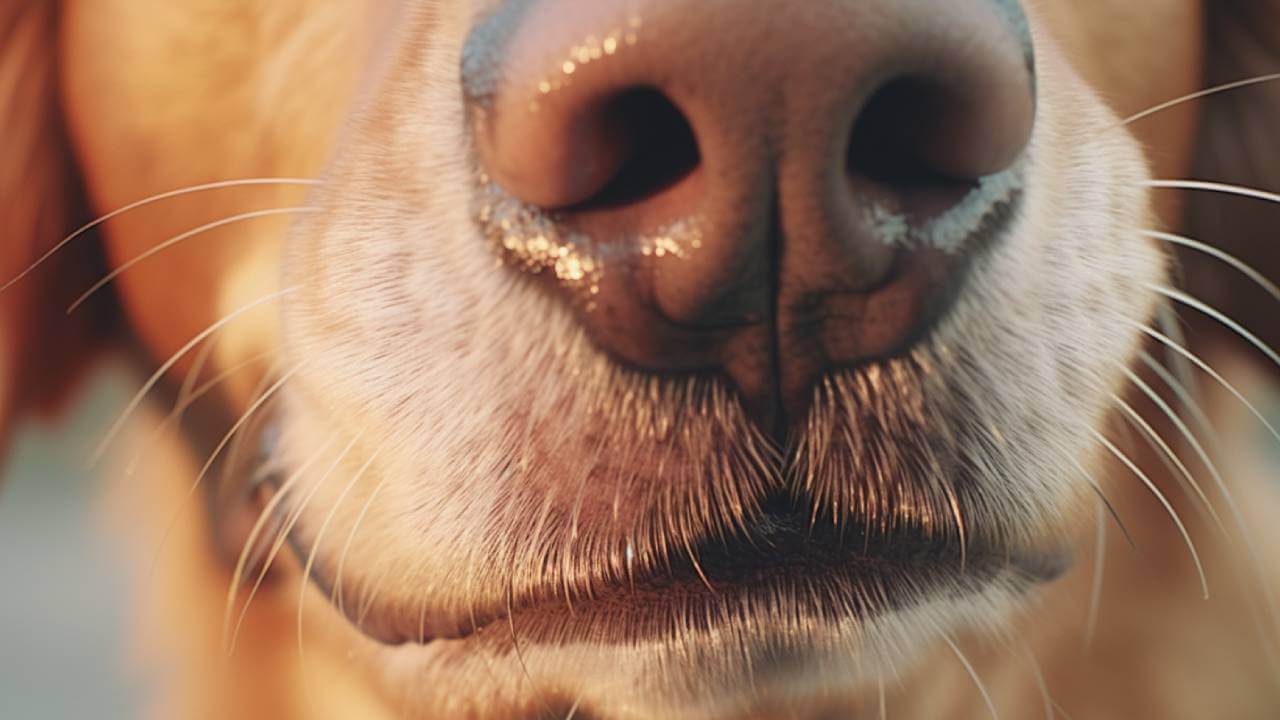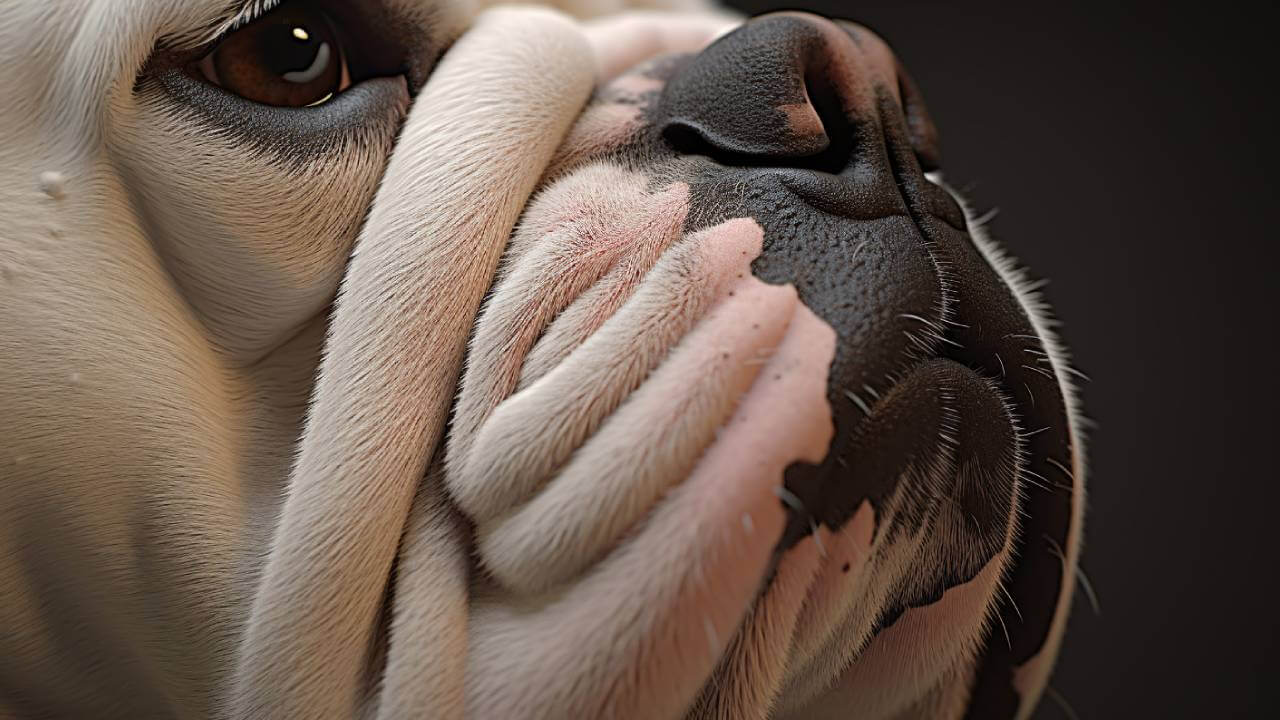When you notice your dog’s normally moist nose has suddenly turned dry, it’s easy to worry. Is it a fleeting change or a sign of something more serious? “Why Is My Dog’s Nose Dry?” explores environmental influences, hydration levels, and the impact of age and breed-specific traits.
Let’s find out what factors can cause your pup’s nose to lose its characteristic wetness. We will sniff out the truth behind dry dog noses, demystifying this curious condition and what it means for your furry friend.
What Does It Mean When a Dog’s Nose Is Dry?
A dog’s nose can be dry for various reasons, often linked to environmental factors or natural fluctuations in hydration levels. Changes in the weather, exposure to dry air, and more, as we shall discover.
In some cases, nose dryness might not necessarily signal a health issue but could be a brief, normal occurrence for your canine companion.
Those interested in the scientific methods behind assessing a dog’s health through nose temperature should learn about the accuracy of tactile assessment of canine nose temperature to identify rectal hyperthermia and hypothermia in dogs.
Reasons Your Dog’s Nose is Dry
1. Sleeping Habits: Dogs’ noses often dry out during sleep due to reduced licking and decreased tear production, which generally keep the nose moist. Upon waking, you might notice their nose is drier than usual, but it should return to its normal state shortly.
2. Dehydration: Lack of adequate water intake can lead to dehydration, which manifests in several ways, including a dry nose. Ensuring your dog has constant access to fresh water is essential for overall health.
3. Environmental Factors: Weather and climate play significant roles in the moisture level of your dog’s nose. Dry, hot, or cold weather can lead to a dry nose. Indoors, air conditioning in summer and heating in winter can also reduce humidity and contribute to drying out your dog’s nose.
4. Age: Older dogs may have drier noses due to decreased bodily fluid production or less frequent licking. It’s important to monitor any other changes that might indicate health issues common in senior dogs.
5. Breed Specificity: Certain dog breeds with flat faces (brachycephalic breeds), like Boxers, may have drier noses because their facial structure makes it harder for them to lick their noses efficiently.
A dry nose, particularly if it’s a temporary condition, is usually not a cause for alarm. Observing other accompanying symptoms like lethargy, loss of appetite, or changes in behavior is crucial.

The Benefit of Wet Noses in Dogs
Discover more about the common belief and scientific perspective behind a wet nose in the guide: does a wet nose mean a healthy dog? Dogs’ wet noses are integral to their health and impressive sensory capabilities. Below are the key benefits this characteristic provides:
- Enhanced Sense of Smell: Wet noses capture scent particles more effectively, enhancing dogs’ already superior olfactory senses. Moisture acts like a scent adhesive, improving the detection and differentiation of smells.
- Temperature Regulation: A moist nose aids in cooling down a dog’s body temperature through evaporation. This is essential for thermoregulation, especially since dogs don’t sweat through their skin.
- Improved Detection of Direction: Wetness helps dogs determine where a scent comes from, which is crucial for tracking and hunting. Enhances their ability to navigate and understand their environment.
- Health Indicator: A moist nose generally indicates good health. Sudden changes in nose moisture or texture can signal potential health issues.
- Social Interaction: A keen sense of smell, aided by a wet nose, allows dogs to gather information about others. Helps in understanding the social hierarchy, mood, and intentions during interactions.
- Aiding in Hydration: Licking their noses contributes, albeit minimally, to their hydration. This is especially beneficial in warmer climates or conditions.
- Protection Against Infections: The mucus on a dog’s nose traps harmful particles like bacteria and viruses. Contains enzymes that can help neutralize pathogens, adding an immune defense layer.
Maintaining Nose Health
Keeping a dog’s nose healthy involves:
- Ensuring constant access to fresh water for hydration.
- Providing a balanced diet to support overall health, including skin and nose moisture.
- Protecting them from harsh weather conditions to prevent dryness or sunburn.
- Observing changes in the nose’s condition can be early signs of health issues.
Certain breeds, especially flat-faced (brachycephalic) breeds and Griffons, which may suffer from conditions like Nasal hyperkeratosis, often experience dry noses due to their unique facial structures. A well-maintained wet nose is critical to a dog’s sensory and health status.
Should I Bring My Dog to the Vet if His Nose Is Dry?
In most cases, a dry nose isn’t a cause for immediate alarm. However, suppose the dryness persists for an extended period and is accompanied by other symptoms such as lethargy, loss of appetite, or nasal discharge.
To be prepared for health concerns, consider exploring dog insurance plans for peace of mind. If so, it might be a good idea to consult your veterinarian.
These symptoms could indicate an underlying health issue that requires attention. A dry dog nose is usually temporary and harmless, often influenced by environmental factors and your dog’s characteristics. The important thing is to observe your dog’s overall behavior and well-being.
If you’re unsure or notice concerning symptoms alongside the dry nose, don’t hesitate to seek guidance from your veterinarian.

FAQs
Can the weather affect my dog’s nose moisture levels?
Yes, the weather plays a significant role in the moisture levels of your dog’s nose. Dry, hot weather can lead to your dog having a dry nose, just as cold weather can cause chapping and dryness. Increasing indoor humidity and ensuring your dog stays hydrated can help mitigate these effects.
How does age impact the dryness of a dog’s nose?
As dogs age, they might experience more frequent dryness of the nose. This can be due to a decrease in their body’s overall hydration levels or less self-grooming behavior, which in younger dogs helps to keep their nose moist. Senior dogs may benefit from regular check-ups to ensure their nose dryness isn’t signaling underlying health issues.
Are there specific breeds that are more prone to having a dry nose?
Yes, certain dog breeds with shorter snouts, like Bulldogs, Pugs, and Boston Terriers, are more prone to experiencing a dry nose. This condition can result from their unique facial structure, which may limit their ability to lick their noses effectively, a natural mechanism for maintaining moisture.
Can a dry nose be indicative of sunburn?
Absolutely. Dogs can get sunburned, especially on exposed areas like the nose. A dry, cracked nose might indicate sunburn, particularly in dogs with lighter-colored noses. Protecting your dog with pet-safe sunscreen when spending extended periods outdoors can prevent sunburn.
What daily care routine can help prevent my dog’s nose from drying out?
Maintaining a daily care routine that includes checking your dog’s nose for signs of dryness or cracking, ensuring they have constant access to fresh water, and using a vet-recommended nose balm can help prevent dryness. Also, keeping your dog out of excessively windy or sunny conditions without protection can help maintain nose moisture.
Regular vet visits can also catch any underlying conditions contributing to nose dryness.






Noticed my dog’s nose getting dry recently. Should I be concerned, or is it just a normal thing sometimes?
s it a cause for concern, or is it normal for dogs to have dry noses sometimes?